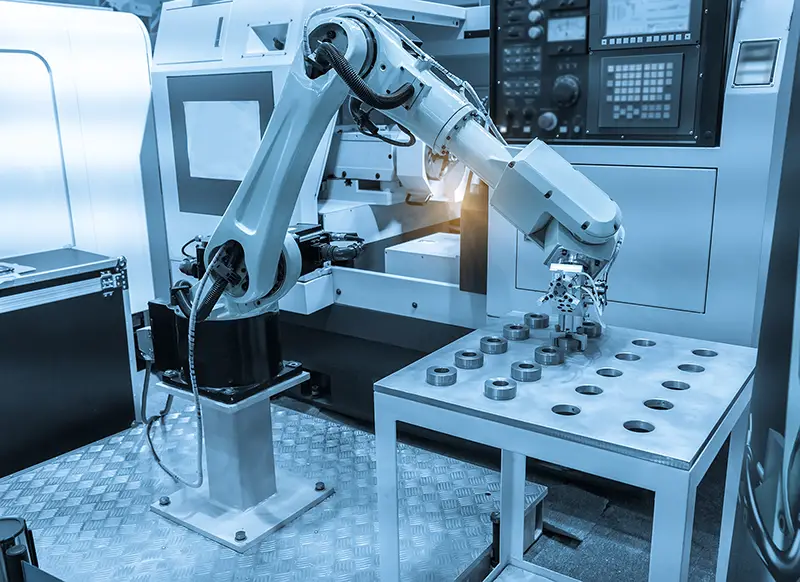Click here to get this post in PDF
As industrial AI infiltrates manufacturing, it changes how things are done. Factories are becoming more efficient and productive due to the deployment of industrial AI applications. In the past, if a company wanted to update its manufacturing process, it would have to hire new engineers to come in and figure out how to do it.
But now, with industrial AI, companies can automate the process of updating their manufacturing processes using algorithms that can learn from data. This is just one way that industrial AI changes manufacturing for the better.
Here are five more ways industrial AI is revolutionizing manufacturing with various arrays of NetSuite Implementations.
Automatic Quality Control
The quality control process is one of the essential parts of manufacturing. It ensures that a product meets specific standards before it’s shipped to customers.
But doing this manually can be time-consuming and expensive, mainly when thousands or even millions of products are produced. That’s why many companies are now using industrial AI to automate the quality control process.
Industrial AI can automatically detect defects in products and then recommend corrective actions. This speeds up the quality control process, but it also reduces the number of defective products shipped to customers.
Predictive Maintenance
One of the biggest headaches for manufacturers is unexpected machine failures. These failures can cause disruptions in production, resulting in lost revenue. Equipment needs to be appropriately maintained to function correctly and produce high-quality products.
But often, companies don’t have enough information about how their equipment is performing until something breaks down. This can cause costly downtime and delays in production.
One way industrial AI is helping to solve this problem is through predictive maintenance. Industrial AI applications can monitor machinery and predict when it will fail to be fixed before there’s an interruption in production.
This reduces downtime and saves companies money by reducing the number of unexpected failures.
Managing Inventory
One of the biggest challenges for manufacturers is keeping track of their inventory. If there’s not enough stock on hand, it can cause production delays and lost sales. But if there’s too much stock on hand, it takes up valuable warehouse space and increases storage costs.
That’s why many companies are now using industrial AI to manage their inventory. Industrial AI applications can predict how much stock is needed for a particular product and then order more when necessary.
This ensures that there’s always enough stock on hand and reduces the amount of money companies spend on inventory storage costs.
Automatic Process Control
Process control is another critical part of manufacturing. It ensures that the manufacturing process is running smoothly and produces high-quality products. But managing a process can be difficult, especially when multiple steps are involved.
It takes a lot of time and money to train workers on how to run machines correctly, leading to delays in production and lost revenue. But with industrial AI, companies can automate their production processes to run smoothly without any human intervention.
Industrial AI applications can monitor machine performance and make adjustments when necessary to ensure that the production process stays on track. This not only speeds up production but also reduces the number of defective products produced. It also reduces costs by eliminating unnecessary steps from being performed.
Facilitating Data-Driven Decision Making
The manufacturing industry is rapidly changing. Therefore, manufacturers need to adapt quickly to stay competitive and profitable.
But many companies are still using outdated business processes that make it difficult for them to keep up with their competitors. That’s where industrial AI comes in.
Industrial AI applications can analyze large amounts of data from different sources to help companies make data-driven decisions. This allows companies to see what’s working and what’s not to make the necessary changes quickly.
With industrial AI, manufacturers no longer rely on gut feelings or hunches when making crucial business decisions. Instead, they can now use data to back up their choices and create a more efficient business.
Conclusion
Industrial AI is revolutionizing the manufacturing industry. It’s helping companies to reduce downtime, manage inventory, automate production processes, and make data-driven decisions. This allows them to stay competitive and profitable in a rapidly changing industry.
If you’re looking for a way to improve your manufacturing business, industrial AI is the solution you’ve been looking for. However, industrial AI is not a one-size-fits-all solution. Instead, you need to find an industrial AI application specifically designed for your industry and business needs. So if you’re ready to take your manufacturing business to the next level, contact NetSuite consulting today, and we’ll help you get started.
You may also like: 5 Challenges SMMs Face When Turning to Digital Manufacturing
Image source: Shutterstock.com

